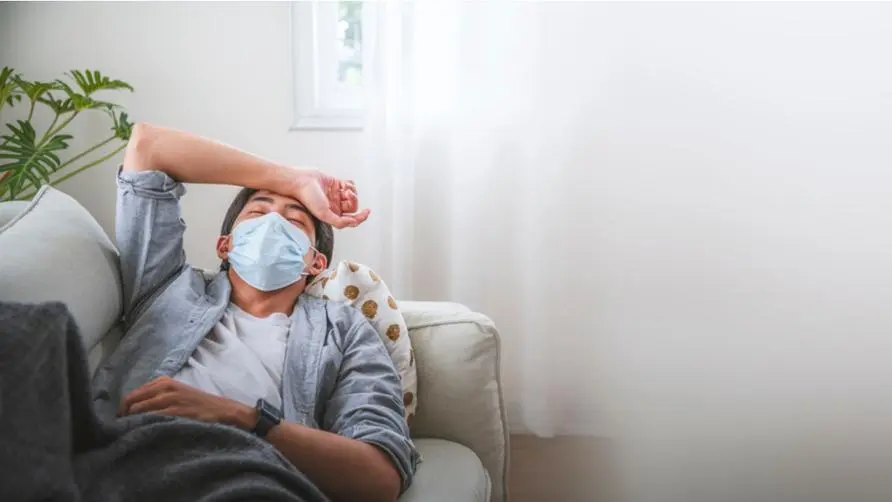Are you prone to breathlessness and fatigue after being diagnosed? Doctors reveal 3 key points of "self-care": speeding up physical recovery

Are you prone to breathlessness and fatigue after being diagnosed? Doctor: “Self-care” speeds up recovery
A century-old epidemic has affected human health around the world, and the cumulative number of people infected with the disease in Taiwan has exceeded 8 million. After being diagnosed, many people become breathless and tired easily, and feel that their cardiopulmonary condition and physical strength have declined significantly, and they need to improve their self-care abilities. Dr. Liu Pengchi from the Family Medicine Department of Shin Kong Hospital pointed out that if symptoms such as shortness of breath and chest tightness occur after infection, you should first undergo X-ray and pulmonary function tests to evaluate whether the cardiopulmonary function is abnormal. If there are no abnormalities in the examination, you can start with exercise, nutrition, and prevention. Take care of yourself at all levels to help your body recover.
Dr. Liu Pengchi said that people who still feel short of breath and tired after diagnosis should engage in exercises to help improve cardiopulmonary function according to their own abilities, and gradually increase the intensity. A sound immune system requires comprehensive and balanced nutritional support, and a daily diet is not sufficient. All ethnic groups should pay attention to nutritional supplements. In addition, protein is related to body tissue repair and antibody production, so be sure to consume enough protein.
“Of course, if you have bad habits of smoking or staying up late, you should avoid them as much as possible. With exercise, nutrient and protein intake, and good rest, if your physical condition has not improved after 3-6 months of self-care, you should remember to seek medical treatment. examine!”
Three key points of self-care! Adequate intake of nutrients
The new coronavirus emerged and ravaged the world. As the autumn and winter weather approaches, the prevalence of influenza viruses, adenoviruses, and respiratory tract viruses have gradually increased, highlighting the importance of self-care among people. However, a recent market survey shows that 90% of people If symptoms are not dealt with, 35% of people will allow symptoms to continue to worsen.
Dr. Liu Pengchi reminded that “prevention”, “symptom relief” and “safe medication” are the three key points of self-care. When mild symptoms occur, you should consult a professional doctor and pharmacist nearby to intervene in health products and appropriate drugs as soon as possible to avoid Symptoms worsen.
Dr. Liu Pengchi said that the human body has two important lines of defense when facing germs. The first is the “physical barrier” on the skin surface, and the second is the “specific” and “non-specific” immune cells of the immune system. , all require sufficient vitamins A, B, C, D, E and trace elements such as zinc, copper, and selenium to function well. The root of self-care is “prevention”. You should exercise moderately, get enough sleep, and eat a balanced diet. If If this is not possible, you can help your immune system stay healthy through the intervention of appropriate health products.
Is the epidemic a “diabetic candidate”? Treat mild symptoms early
“Self-care will affect recovery! For example, many people will ask, do you need to see a doctor if you have a cold? If you take good self-care and are in good health, you are indeed expected to recover naturally within a week. But if you don’t take good care of yourself, it is recommended to start early Consult a doctor or pharmacist to ensure your body’s needs are adequately supplemented, and more importantly, take medication safety into consideration to achieve good self-care!”
Dr. Liu Pengchi pointed out that the century-old epidemic has brought about drastic changes in the social public health system and people’s physical and mental health. Some studies have even pointed out that the health changes of some diagnosed people seem to have become “diabetes candidates” overnight, and the risk of diabetes and diabetes has increased significantly. The risks of various chronic diseases increase the need for self-care.
However, market surveys show that 76% of the public do not understand the differences in ingredients and efficacy of over-the-counter medicines. Among the eight nutrients related to supporting immunity, deficiencies in vitamin D, vitamin E and zinc are more common. Dr. Liu Pengchi suggested that people who have the above self-care issues can go to the nearest store with a professional pharmacist and consult with the pharmacist on-site to learn about correct medication and nutritional supplements. In daily life, you should master the three major steps of self-care:
Prevention - In addition to maintaining external protection, internal care is also important, such as mental health maintenance and balanced nutritional intake. You can maintain your own health through health care products such as multivitamins, probiotics, and oral health care products.
Relieve symptoms - deal with mild symptoms as soon as possible. It is recommended to keep over-the-counter medicines at home such as painkillers, cold medicines, etc.;
Safe medication use - According to the guidelines of the World Health Organization, the public’s knowledge of medicine is insufficient, and the support of professional health personnel is very important. Professionals can be used to understand the correct medication knowledge on a daily basis.
Further reading:





